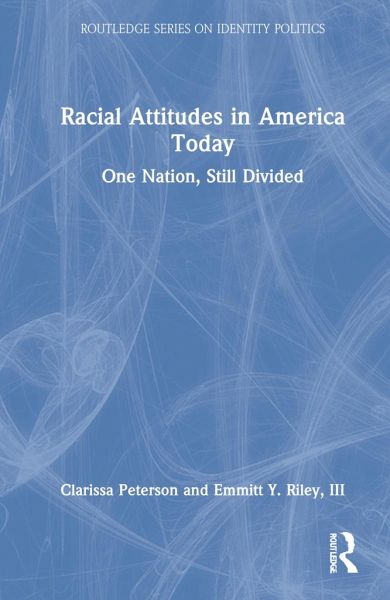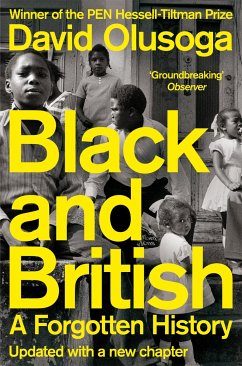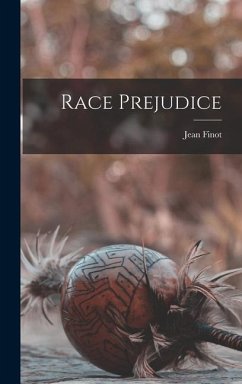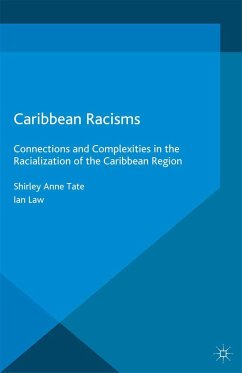Racial Attitudes in America Today
One Nation, Still Divided
Versandkostenfrei!
Versandfertig in über 4 Wochen
Weitere Ausgaben:

PAYBACK Punkte
89 °P sammeln!





With this book, Clarissa Peterson and Emmitt Y. Riley, III dive into how racial attitudes change and inform political decisions.
Clarissa Peterson is a Professor of Political Science at DePauw University. She has published work on Black politics, racial resentment, and working mothers in academe. Professor Peterson has received numerous awards from various members of the DePauw community. She holds professional memberships in the American Political Science Association and the National Conference of Black Political Scientists where she was awarded the Anna Julia Cooper Teaching Award (2016). Emmitt Y. Riley, III is an Associate Professor of Political Science and Africana Studies at DePauw University and the President-Elect of the National Conference of Black Political Scientists. He has published work on Black politics, political representation, and racial resentment. An expert in racial and Black Politics, in 2018, he was named the 2018 Anna Julia Cooper Teacher of the Year by the National Conference of Black Political Scientists. In 2020, he received the Fannie Lou Hamer Award for Service by the National Conference of Black Political Scientists.
Produktdetails
- Verlag: Taylor & Francis
- Seitenzahl: 152
- Erscheinungstermin: 19. April 2022
- Englisch
- Abmessung: 229mm x 152mm x 11mm
- Gewicht: 399g
- ISBN-13: 9780367706722
- ISBN-10: 0367706725
- Artikelnr.: 63047703
Herstellerkennzeichnung
Libri GmbH
Europaallee 1
36244 Bad Hersfeld
gpsr@libri.de
"In Racial Attitudes in America Today: One Nation, Still Divided, Clarissa Peterson and Emmitt Y. Riley have written a comprehensive assessment of the impact of racial attitudes in contemporary American politics and on the future of American democracy. This is an extremely timely research project considering the racial strife and backlash that continues to occur in America and all around the world. Because race remains a divisive topic in all aspects of life, this book will enhance our understanding as to why Blacks, Whites, Asians, and Hispanics think as they do and the impact of their thinking on their political behavior. This interdisciplinary study will be useful for students, scholars, and laymen and will provoke many
Mehr anzeigen
discussions about the continuing significance of race in American society."
Sharon D. Wright Austin, Professor of Political Science at the University of Florida Gainesville
"Although the trend is changing, it remains far too common in the study of racial and ethnic politics for scholars to center the attitudes and actions of White Americans-oftentimes by exploring how White citizens consider persons of color when making political decisions. By cross-comparing the viewpoints of African Americans, White Americans, Latinos, and Asian Americans, professors Peterson and Riley join a growing list of scholars who paint a fuller picture of group relations in the United States."
Ray Block Jr., Associate Professor of Political Science and African American Studies, The Pennsylvania State University
"Written during a time of racial upheaval, this book builds on the extant literature by tackling a number of salient issues related to racial and political attitudes. The topics range from race-neutral issues such as health care to race-specific issues such as Black Lives Matter. The authors move beyond the traditional approach of examining inter-racial attitudes possessed by whites and take a deep dive in helping us understand diverse attitudes possessed by Blacks, Asian Americans and LatinX people. One of the most important contributions is that it does not romanticize Black intra-racial attitudes by focusing solely on variables operationalizing black solidarity. Rather, it also highlights the impact of negative anti-Black attitudes in explaining Black political attitudes. This book is timely and an indispensable reference for students and scholars studying American politics, political psychology, sociology, and public policy. It strengthens the foundation for a deeper understanding of the complexity of inter and intra-racial attitudes in the study of race and politics."
Byron D. Orey, Professor of Political Science, Jackson State University
Sharon D. Wright Austin, Professor of Political Science at the University of Florida Gainesville
"Although the trend is changing, it remains far too common in the study of racial and ethnic politics for scholars to center the attitudes and actions of White Americans-oftentimes by exploring how White citizens consider persons of color when making political decisions. By cross-comparing the viewpoints of African Americans, White Americans, Latinos, and Asian Americans, professors Peterson and Riley join a growing list of scholars who paint a fuller picture of group relations in the United States."
Ray Block Jr., Associate Professor of Political Science and African American Studies, The Pennsylvania State University
"Written during a time of racial upheaval, this book builds on the extant literature by tackling a number of salient issues related to racial and political attitudes. The topics range from race-neutral issues such as health care to race-specific issues such as Black Lives Matter. The authors move beyond the traditional approach of examining inter-racial attitudes possessed by whites and take a deep dive in helping us understand diverse attitudes possessed by Blacks, Asian Americans and LatinX people. One of the most important contributions is that it does not romanticize Black intra-racial attitudes by focusing solely on variables operationalizing black solidarity. Rather, it also highlights the impact of negative anti-Black attitudes in explaining Black political attitudes. This book is timely and an indispensable reference for students and scholars studying American politics, political psychology, sociology, and public policy. It strengthens the foundation for a deeper understanding of the complexity of inter and intra-racial attitudes in the study of race and politics."
Byron D. Orey, Professor of Political Science, Jackson State University
Schließen
Für dieses Produkt wurde noch keine Bewertung abgegeben. Wir würden uns sehr freuen, wenn du die erste Bewertung schreibst!
Eine Bewertung schreiben
Eine Bewertung schreiben
Andere Kunden interessierten sich für













